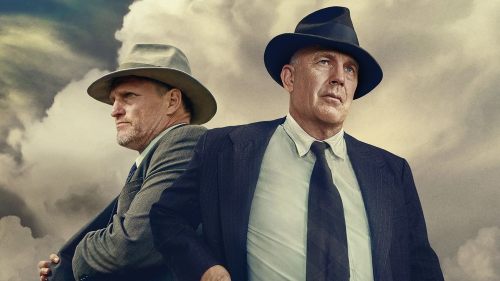Everybody’s Into Weirdness: THOMASINE & BUSHROD (1974)
The Alamo Drafthouse is a brand built on weird. Beyond being situated in a town that has long aspired to remain eccentric in the face of all normality, it’s easy to forget that the original Alamo started as something of a private screening club, running prints of the odd and obscure into all hours of the night. Though the company has obviously grown into an internationally recognized chain of first run movie palaces, the Drafthouse Ritz in Austin, Texas remains committed to showcasing genre repertory programming, namely via its Terror Tuesday and Weird Wednesday showcases. This column is a concentrated effort to keep that spirit of strangeness alive, as programmers Joe A. Ziemba and Laird Jimenez (often pulling from the extensive AGFA archives) are truly doing Satan’s bidding by bringing ATX weekly doses of delightful trash art.
The thirty-sixth entry into this disreputable canon is the Blax Bonnie & Clyde riff, Thomasine & Bushrod…

Year: 1974
Trailer: The Mack Is Back; Take a Hard Ride
The Blaxploitation Western is something of a niche sub-subgenre within exploitation, repurposing the sensibilities of Italy and Spain’s spaghetti takes on America’s favorite '50s studio product while tossing in a splash of “urban” sensibilities (if we’re going to speak the lingo of racist producers for a second). It was a basic stylistic integration, as the Old West setting allowed for storylines that easily explored Blax’s favorite themes: namely the struggle against bigoted oppressors and the systems they’d constructed to keep persons of color down. But while the subset was undoubtedly born from a desire to market a specific cinematic mold to an audience who had rarely seen their own images inserted into a frontier setting, few Blax Westerns actually found box office success. From 1970 to 1976 – arguably the absolute height of the Blaxploitation era – there were fourteen Westerns produced and released. However, none were as intimate (and certainly not as warm) as Thomasine & Bushrod, in which Max Julien (The Mack) and Vonetta McGee (Blacula) endure the difficulties of maintaining a healthy marriage amidst rampant persecution for living an outlaw lifestyle.
Thomasine & Bushrod was originally pitched by Julien (who acts as sole writer and co-producer) as the African American answer to Arthur Penn’s Bonnie and Clyde. McGee (with whom Julien was romantically involved during the picture’s conception) plays Thomasine, the sultry, shotgun-wielding B.E. Parker, while the mastermind behind the picture is her Mr. Barrow. Together, they’re a pair of fictional thieves, operating in the Southwest between 1911 and 1915, who fancied themselves Robin Hoods, robbing from the White Establishment and redistributing the wealth to poor Mexicans, Native Americans and Whites. Their targets are Caucasian financial institutions, who collectively appoint their own racist Sheriff of Nottingham (George Murdock) to hunt down the banditos. A simple story told a thousand times over, but the unique POV Julien and McGee bring to the narrative sets Thomasine & Bushrod apart from it’s Blax Western brethren. Uninterested in strictly playing in a pulp sandbox, they instead craft a flesh and blood adult relationship that’s gorgeous and genuine.
There’s a level of tenderness conveyed by the two lead performances that feels lived-in and real and becomes the beating heart of Thomasine & Bushrod. Those who only know Julien from The Mack will instantly notice that he’s dialed his persona down significantly. His brown eyes alternate between smooth and sad as the realization that he and his lover’s days are numbered begins to slowly creep in. But the real treat is McGee, whose intensity and playfulness with her co-star is an utter delight. As the film begins to zero in on the fugitives’ psychosexual domestic strife, McGee becomes a rigid emotional center. Her performance highlights the legitimate tragedy that fuels every narrative beat, as we watch her struggle against a system that not only dogs the two for stealing from the tyrannical rich and giving back to the demoralized poor, but also robs the lovers of the simple pleasures of building a home together. Though they’re remembered by fictional legions as folk heroes, the audience will no doubt look back on J.P. Bushrod and Ms. Thomasine as nothing more than a husband and wife, stealing distinct moments of cherished couple-hood whenever they’re allowed a moment to catch their breath.
Gordon Parks Jr. brings a workmanlike eye to the picture, weaving in jangly Blax visual strands he grasped on Superfly (along with loads of off-kilter framing) while touching upon revisionist maestro Sam Peckinpah’s editing schematics. A slow motion romp in a creek becomes infinite, letting us linger on a cozy instant until the point of intrusion. Yet where The Ballad of Cable Hogue abandoned the Western’s violent shootouts in favor of developing characters’ rapport, Thomasine & Bushrod utilizes a desperado construct as narrative sleight of hand. Julien and Parks spoon-feed just enough competently staged action in order to keep you intrigued by the picture’s primary concerns. Once another deft bit of slo-mo is utilized to heartbreakingly recall these earlier moments of bliss, the movie revels in genre craft, trafficking an agenda all its own. The system doesn’t just destroy people, but love itself, without mercy or remorse.
Though the final two reels of Thomasine & Bushrod devolve into incongruous silliness, suddenly introducing Jomo, the Jamaican gunslinger (a hysterical Gynn Turman), the movie maintains a fatalistic tone throughout. Our heroes are dashing across the desert toward a finish line that more than likely doesn’t exist, hoping to outrun forces they can’t hope to control. All they have is the shared experience with each other, helping to make each shitty day just a little bit better. Where so many Blaxploitation films (rightfully) concentrate on the hate its stars and creators had to stomach, Thomasine & Bushrod instead looks to showcase the love that strives to survive in the face of such intolerable cruelty. It’s a shame Julien and Parks produced little writing and directing work (Julien’s only other credits are the Cleopatra Jones films and Parks died in a 1979 plane crash) as their lone collaboration is truly special, standing head and shoulders above similar product from its distinct era.
This Week at Weird Wednesday: Hard Ticket to Hawaii
Previous WW Features: Penitentiary; Skatetown USA; Blood Games; The Last Match; Invasion of the Bee Girls; Julie Darling; Shanty Tramp; Coffy; Lady Terminator; Day of the Dead; The Kentucky Fried Movie; Gone With the Pope; Fright Night; Aliens; Future-Kill; Ladies and Gentlemen…The Fabulous Stains; Pieces; Last House on the Left; Pink Flamingos; In the Mouth of Madness; Evilspeak; Deadly Friend; Don’t Look in the Basement; Vampyres; She; Dolls; Alice, Sweet Alice; Starship Troopers; Message From Space; Rabid; Child’s Play; Lost in the Desert; Suspiria; Effects; Friday the 13th Part VIII: Jason Takes Manhattan


